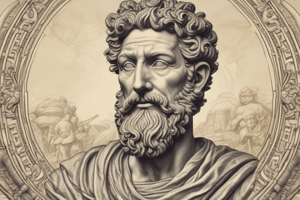Podcast
Questions and Answers
Selon le texte, quel est le concept central de la physique stoïcienne ?
Selon le texte, quel est le concept central de la physique stoïcienne ?
- La providence
- Le panthéisme (correct)
- La rationalité
- La dialectique
Parmi les principes fondamentaux du stoïcisme, lequel n'est PAS mentionné dans le texte ?
Parmi les principes fondamentaux du stoïcisme, lequel n'est PAS mentionné dans le texte ?
- La logique
- La politique (correct)
- La physique
- L'éthique
Selon le texte, quelle est la vision stoïcienne de Dieu ?
Selon le texte, quelle est la vision stoïcienne de Dieu ?
- Un principe rationnel régissant l'univers (correct)
- Un ensemble de divinités polythéistes
- Une force divine immanente dans la nature
- Un être suprême tout-puissant
Quel est le rôle de la logique dans la philosophie stoïcienne ?
Quel est le rôle de la logique dans la philosophie stoïcienne ?
Quel est le lien entre la vertu et l'émotion dans la philosophie stoïcienne ?
Quel est le lien entre la vertu et l'émotion dans la philosophie stoïcienne ?
Quel est le principe central de la façon de vivre préconisée par le stoïcisme ?
Quel est le principe central de la façon de vivre préconisée par le stoïcisme ?
Quelle école philosophique a influencé le stoïcisme ?
Quelle école philosophique a influencé le stoïcisme ?
Quel principe fondamental du stoïcisme est lié à l'idée d'un ordre rationnel dans l'univers ?
Quel principe fondamental du stoïcisme est lié à l'idée d'un ordre rationnel dans l'univers ?
Selon le stoïcisme, que représentent les biens véritables ?
Selon le stoïcisme, que représentent les biens véritables ?
Quelle école philosophique grecque a fondé le stoïcisme ?
Quelle école philosophique grecque a fondé le stoïcisme ?
Quelle différence majeure existe entre le stoïcisme et les autres écoles philosophiques grecques ?
Quelle différence majeure existe entre le stoïcisme et les autres écoles philosophiques grecques ?
Quel principe stoïcien prône le développement de la maîtrise de soi et de la force d'âme ?
Quel principe stoïcien prône le développement de la maîtrise de soi et de la force d'âme ?
Flashcards are hidden until you start studying
Study Notes
Stoicism: A Philosophy of Virtue and Happiness
Stoicism is an ancient Greek philosophy that has been influential for over two thousand years. It teaches the development of self-control and fortitude as a means to overcome destructive emotions and develop peace and happiness. Stoicism emphasizes personal ethics informed by its system of logic and its views on human nature and virtue, especially as reflected in the works of the Roman philosopher Marcus Aurelius. The philosophy was also influenced by other schools such as Cynicism and Pyrrhonism.
Philosophie Stoïcienne
The Stoic school of philosophy, founded by Zeno of Citium in Athens around 300 BCE, was one of the major schools of Hellenistic philosophy and belonged to the tradition of ancient Greek philosophy known as Stoticism or Stoicism. Stoicism combined elements from earlier Greek philosophies, particularly those of Heraclitus, Plato, Aristotle, the Cyrenic School, and the Cynics. However, Stoicism departed from these schools in several significant ways. Firstly, while other schools focused on physical phenomena, Stoicism took a more abstract view of reality. Secondly, while early schools identified various aspects of good with pleasure and wealth, Stoicism identified goods primarily with virtues like wisdom and courage.
Premises and Principles
There are four main principles of Stoicism:
- Logic: Stoicism is known for its logical system, which is based on the idea of a rational order in the universe. It uses the idea of "cathegorein" (to divide) to understand the world.
- Physics: Stoicism accepts a pantheistic view of the universe, which holds that the universe is a living entity and that all things are interconnected.
- Ethics: Stoicism is a moral philosophy that emphasizes the importance of virtue and character in leading a good life.
- Theology: Stoicism has a unique view of God, which is often referred to as "the Logos" or the rational principle that governs the universe.
Principes Stoïciens
The principles of Stoicism can be summarized in four main categories: logic, physics, ethics, and theology. These principles are interconnected and form the foundation of Stoic philosophy.
Premises in Logic
In Stoicism, logic plays a crucial role in understanding reality. The Stoics developed a system called "dialectic," which involves breaking down concepts into their basic elements and then reconstructing them based on those elements. This process helps Stoics understand the world by categorizing things according to their properties and relationships.
Premises in Physics
Physically, Stoicism views the universe as a living entity composed of fire, air, water, earth, and the stars. It also believes in the existence of providence, which acts as a guide for human actions.
Ethical Premises
Ethically, Stoicism emphasizes the importance of virtue and character in leading a good life. Virtue, according to Stoicism, is the only true good, and everything else is either indifferent or bad depending on how we use our judgment.
Theological Premises
In terms of theology, Stoicism holds a unique view of God. Stoics believe in the Logos, which they see as the rational principle that governs the universe. This concept allows them to understand the world through reason and understand their place within it.
Virtue and Emotion in Stoicism
One key aspect of Stoic philosophy is the importance of controlling one's emotions. Stoics believed that emotions were not inherently evil but could be harmful if allowed to control us. They taught techniques such as meditation, visualization, and cognitive reframing to help individuals manage their emotional responses and maintain inner peace.
Living According to Nature
Another fundamental principle of Stoicism is living according to nature. This means understanding your role in the natural order of things and fulfilling that role with virtue and reason.
Stoicism Today
Despite its ancient origins, Stoicism remains relevant today. Its emphasis on character development, self-control, and the pursuit of wisdom continues to inspire people seeking a meaningful life. Modern adaptations of Stoic practices like mindfulness meditation and cognitive behavioral therapy have gained popularity, demonstrating the continued relevance of this ancient philosophy for contemporary audiences.
In conclusion, stoicism offers a unique perspective on how individuals can live a virtuous life filled with happiness and inner peace. Its principles, derived from ancient Greek philosophy, continue to influence modern thought and provide guidance for those seeking meaning and purpose in life.
Studying That Suits You
Use AI to generate personalized quizzes and flashcards to suit your learning preferences.




